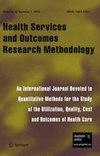Emergency department pathology order support tool (ED POST): a protocol using qualitative inquiry to inform design and development of a prototype to reduce low value care
IF 1.6
Q3 HEALTH CARE SCIENCES & SERVICES
Health Services and Outcomes Research Methodology
Pub Date : 2023-09-15
DOI:10.1007/s10742-023-00314-1
引用次数: 0
Abstract
Abstract Laboratory tests have an important role in informing diagnosis and aiding in the determination of appropriate courses of management and/or treatment in the Emergency Department setting. Over-ordering of laboratory tests can lead to increased costs and/or unnecessary patient procedures, whilst under-ordering can lead to patient safety concerns and/or diagnostic error. Reducing over/under ordering through appropriate use of pathology has the potential to improve patient safety and/or reduce healthcare costs. As a dynamic electronic decision support tool, the Emergency Department Pathology Order Support Tool (ED POST) aims to facilitate effective ordering of pathology tests. This protocol details the methodological approach to be undertaken during the design and development of ED POST, commencing from the outset of the initial development of a prototype design. The research will undertake qualitative methods (interviews, focus group, and think-aloud observations) to develop business process models through collaboration with Emergency Department clinicians. The pre-development research will constitute stage 1 of the approach, with stage 2 focussed on evaluating the utility, usability and business process impact of the prototype to refine the prototype’s design. The collaborative and qualitative multi-method approach aims to elucidate an in-depth understanding of existing laboratory test ordering and decision-making processes in the Emergency Department, serving to inform the development of a relevant and practicable solution. Health researchers and digital health developers can draw on this approach to inform research planning activities for health information technology intervention design projects and can follow the developmental journey of ED POST as its outcomes are reported in the literature.急诊科病理命令支持工具(ED POST):一种使用定性调查来告知设计和开发原型以减少低价值护理的协议
在急诊科,实验室检查在告知诊断和帮助确定适当的管理和/或治疗方案方面具有重要作用。过多订购实验室检查可能导致成本增加和/或不必要的患者程序,而订购不足可能导致患者安全问题和/或诊断错误。通过适当使用病理学来减少过量/不足的医嘱,有可能提高患者的安全性和/或降低医疗成本。作为一个动态的电子决策支持工具,急诊科病理命令支持工具(ED POST)旨在促进有效的病理检查命令。本协议详细说明了从原型设计的初始开发开始,在ED POST的设计和开发过程中所采用的方法方法。该研究将采用定性方法(访谈、焦点小组和有声思考观察),通过与急诊科临床医生合作开发业务流程模型。开发前研究将构成该方法的第一阶段,第二阶段侧重于评估原型的实用性、可用性和业务流程影响,以完善原型的设计。协作和定性的多方法方法旨在阐明对急诊科现有实验室测试订购和决策过程的深入理解,为制定相关和切实可行的解决方案提供信息。卫生研究人员和数字卫生开发人员可以利用这种方法为卫生信息技术干预设计项目的研究规划活动提供信息,并且可以跟踪ED POST的发展历程,因为其结果已在文献中报道。
本文章由计算机程序翻译,如有差异,请以英文原文为准。
求助全文
约1分钟内获得全文
求助全文
来源期刊

Health Services and Outcomes Research Methodology
HEALTH CARE SCIENCES & SERVICES-
CiteScore
3.40
自引率
6.70%
发文量
28
期刊介绍:
The journal reflects the multidisciplinary nature of the field of health services and outcomes research. It addresses the needs of multiple, interlocking communities, including methodologists in statistics, econometrics, social and behavioral sciences; designers and analysts of health policy and health services research projects; and health care providers and policy makers who need to properly understand and evaluate the results of published research. The journal strives to enhance the level of methodologic rigor in health services and outcomes research and contributes to the development of methodologic standards in the field. In pursuing its main objective, the journal also provides a meeting ground for researchers from a number of traditional disciplines and fosters the development of new quantitative, qualitative, and mixed methods by statisticians, econometricians, health services researchers, and methodologists in other fields. Health Services and Outcomes Research Methodology publishes: Research papers on quantitative, qualitative, and mixed methods; Case Studies describing applications of quantitative and qualitative methodology in health services and outcomes research; Review Articles synthesizing and popularizing methodologic developments; Tutorials; Articles on computational issues and software reviews; Book reviews; and Notices. Special issues will be devoted to papers presented at important workshops and conferences.
 求助内容:
求助内容: 应助结果提醒方式:
应助结果提醒方式:


